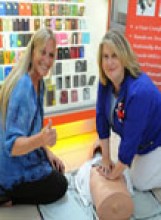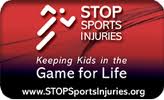Archive for January, 2012
Superbowl and Food Poisoning
Posted by: | CommentsWith the Superbowl just around the corner many of us are in the initial plans for preparing for a Superbowl party. Food usually takes center stage and we breakout our old favorite recipes for chili’s, meatballs and other hot party foods. Our slow cookers are pulled out from the back of the cabinet and put into play. Foods not prepared properly in a slow cooker can give our guest an evening of digestive unrest. Nothing worse than hearing from friends and family that they spent the evening hugging the porcelain princess.
Done properly your special recipes can be the hit of the party. Improperly prepared foods in a slow cooker can make your guest sick and in severe situations actually kill. To make sure you have a fun and food safe event follow the following rules when using your slow cooker.
1) Do not leave raw meats in a slow cooker without it being turned on. This may seem to be a simple warning, but if raw meat sits in a slow cooker for an extended period ( 2 hours or more) without the temperature turned on, bacteria’s will begin to multiply rapidly. You must discard the meat even if seems to be in good condition.
2) Pre-cooked foods from the day before that do not cool thoroughly and are still warm in the middle the next day, are not safe. If you plan on pre-cooking foods like soups, stews and chilis, then warming the next day, place the foods in a shallow container that enables it to cool quickly in the refrigerator.
3) Do not reheat foods in a slow cooker. If you do use pre-cooked foods, rewarm the foods on a stove top or microwave until it is steaming, then use the slow cooker to keep the items warm the rest of the day.
4) Do not place frozen meats and vegetables in a slow cooker. All items must be thawed before being placed into the slow cooker. Leave thawed foods in the refrigerator until ready for use.
Following these simple rules will leave your guest full, safe and satisfied with some great food. Enjoy the game and remember, do not drink and drive.
Heartbreak Increases Heart Attack Risk
Posted by: | CommentsMourning the loss of a loved one increases your chance of a fatal heart attack by six-fold. A sudden flood of stress hormones is believed to be behind the grief-induced heartache, a condition that earlier studies have found is more likely to affect women.
These physical changes occurred immediately after a profound loss. According to a Heart Foundation study, surviving spouses or loved ones were found to have higher blood pressure, increased heart rates and changes to their immune system that increased the risk of a heart attack. Leaving this study to surmise that grieving people were at a significantly higher risk of heart problems.
Of the 160 people in this study, half were mourning the loss of a spouse or child, and their risk of a heart attack increased by six-times. This additional heart attack risk began to subside after six months and leveled out after two years.
This study seems to proof that grieving people were at a significantly higher risk of a heart attack and gave us potential proof that you can indeed die from a broken heart.
To Kill with NSAIDS
Posted by: | CommentsTaking NSAIDs like ibuprofen and Celebrex may increase your chance of a fatal heart attack or a debilitating stroke. Since Vioxx was removed from the marketplace in 2004, experts have been taking a closer look at NSAIDs to see if there are any side effects that could increase the potential of a stroke or cardiovascular death.
A recent study concluded that there was an elevated risk with the use of long term NSAID treatments. In one recent study the potential risk of a myocardial infarction (heart attack) or stroke was increase by fourfold. In fact, ibuprofen was revealed to have a three times increase of a stroke for a patient compared to when given a placebo.
These trials included 116,00 patients, though some physician have inferred that the study doesn’t give the full picture. Many patients that have osteoarthritis and would be on some type of long term NSAID treatment, were older and could have other associated diseases, such as high blood pressure or elevated cholesterol levels, that may have more of an impact on the higher incidents of heart
attacks or strokes.
In any event, doctors should closely look at all variables before beginning a patient onto a long term NSAID therapy. NSAIDs can also cause gastrointestinal problems such as ulcers and bleeding, but they are the most effective treatment for the relief of chronic pain.
Always follow your doctors instructions when taking medications, but discuss with your physician the possibility of a treatment regimen that doesn’t have you taking them regularly (daily), or several times per day. Also inquire with your physician about prescribing the lowest possible dosage.
Maggot Wound Therapy
Posted by: | CommentsSince the earliest forms of recorded medicine, maggots have been used to assist in wound healing. Over the years and the advent of antibiotics, their use has declined, but recently they have had a re-emergence as an acceptable form or modern medicine.
Prior to maggot therapy, a surgical procedure was used. The area was numbed and the unhealthy tissue was cut away. Now with the increase of drug resistant infections, maggot therapy for wound cleaning and healing is starting to make a substantial comeback as a recognized medical treatment.
Several studies on maggot wound therapy, has shown that the healing process is much quicker and less intrusive than conventional surgical wound cleaning. Also the maggot larvae secrete a substance that helps fight wound infection.
Some practitioners of this type of therapy place the maggots directly upon the wound, where they eat away the dead tissue. Others have developed a process where the maggots are placed strategically in a dressing that is placed over the wound and changed on a regular basis.
Believe it or not the FDA does regulates the use of maggots, and they are only available through a doctor’s prescription. They may not be a treatment for all infected wounds, but they are an effective, inexpensive and safe alternative which many insurance companies are beginning to recognize and cover.
Are You Poisoning Your Child?
Posted by: | CommentsPoison Control warns all consumers that lead can still be found in a variety of products available to children. Lead poisoning is a serious health and safety issue for children. Lead poisoning can lead to learning disabilities, anemia, growth problems, attention deficits and aggression behavior issues when children have had direct contact with lead or lead surfaces.
You may be surprised by the different types of lead surfaces you may currently have in your home. To help prevent lead poisoning in children, have them wash their hands and the toys they play with frequently. A great way to check the safety of your child’s toys or surfaces your child may come in contact with are, purchasing a Consumer Lead Testing Kits, which can be found at most hardware stores.
To create a safe environment for your child, here are 10 lead poisoning prevention tips:
- Do not allow children to chew painted surfaces on toys.
- Report chipped or cracked paint to the landlord in homes older than 1978.
- Use Duct Tape to cover peeling or chipping paint surfaces.
- Have your doctor test your child for lead even if they seem healthy.
- Jewelry from Mexico such as watches, bracelets and religious items have found to contain lead.
- Car and house keys contain a small amount of lead. Do not allow babies to chew on them.
- Mexican candies that contain chili or tamarind have been found to also contain lead.
- Run the water faucet for several minutes before using for infant formula preparation. Better yet, use bottled water.
- Avoid consuming canned foods from outside of the United States.
- Many imported folk or home remedies contain lead such as: Pay-loo-ah, Azarcon, Maria Luisa, Liga, Alazron, Greta, Coral, Rueda, Ghasard, Bali Goli, Kandu, farouk and bint al zahab.
As the Poison Center Control jingle says.
” Poison is the kind of thing you’re not supposed to touch
Old prescriptions, cleaning stuff, or spider bites and such
If you swallowed something bad, or think you took too much
Call the Poison Control Center Hotline. We’re the people you can trust.”
US Poison Control Hotline Number: 1-800-222-1222. For more information about poisonings, visit the Poison Control website at www.poison.org.
Reference: Safety,CPRescue– 366
Does Aspirin Prevent Breast Cancer?
Posted by: | CommentsA new study of 116,181 women suggest taking aspirin may reduce the risk of breast cancer in women. Women between the ages of 51 and 70 who took the painkiller at least twice a week over a five year period, showed a 40% reduction in breast cancer risks.
Though this study is provocative, U.S. doctors caution that it is too early to begin recommending women to start an aspirin regiment. This preliminary study shows an association but does not prove a cause and effect. Any long term use of aspirin can have side effects such as stomach bleeding and ulcers.
Still this is encouraging information and the basis for new studies, which may determine frequency and dosages recommendations. Please consult your physician before starting any medicine regiment.
Reference: Health – 124
How to Fight a Cooking Fire
Posted by: | CommentsCooking and Fire Safety – CPRescue
Cooking fires are the number reason for home fires. Though we don’t anticipate one happening, being prepared just in case could make the difference between quickly extinguishing the fire or loosing your home.
When cooking especially with grease or oils, keeping an oven mitt and a lid close-bye will help in case of a small grease fire. If a small grease fire occurs, with the oven mitt on, carefully sliding the lid over the pan to smother the flame. Immediately turn off the burner and do not move the pan. Wait until the pan completely cools before moving it. This will eliminate the potential of the fire re-igniting.
If you are not sure you can treat the fire safely, “when in doubt, just get out.” Leave and close the door behind you to help contain the fire. Call 9-1-1 or the local emergency number after you leave.
If you DO TRY to fight the fire, be sure others are already getting out and you have a clear path to the exit.
Superbowl and Heart Attack Risk
Posted by: | CommentsThis years Superbowl playoff is coming up soon. Having an emotional attachment to a specific team or player in the Superbowl, can have a detrimental effect on your heart. A study published in the New England Journal of Medicine found that emotional sporting events can increase the number of heart attacks.
Researchers have determined that watching events that have a high emotional effect, can increase the release of adrenaline in your body. This rush of adrenaline can have serious and potentially detrimental effects upon those with previous or undiagnosed heart problems.
Best thing you can do to try and minimize your heart risk is:
1. Remain as calm as possible during the big game.
2. If you do smoke, quit; if not reduce or don’t smoke during the game.
3. Avoid overeating.
4. Don’t consume high levels of alcohol.
5. Call 911 if you begin to experience any of the symptoms of a heart attack.
So this year, remember it is just a game. Root for your team, but try and maintain a level emotional response to the outcomes of these games. If at any time you feel heaviness in your chest, numbness or tingling in your left, shortness of breath or excessive sweating, please seek immediate medical attention. Call 9-1-1.
Reference: CPR/Heart – 205
Does Echinacea Help Reduce the Lengths of Colds?
Posted by: | CommentsA recent health study published in the Annals of Internal Medicine showed no significant reduction in the length or the severity of cold ailments with the use of Echinacea.
In this study, over 700 patient between the ages of 12 and 80, took part in identifying if Echinacea can assist in reducing the severity or the duration of a cold. This blind study had individuals taking Echinacea, a placebo or no pills at all. In the end patients taking echinacea did report a slight improvement of about 1/2 day in the duration of the symptoms. They also reported a slight reduction in the severity of the cold symptoms.
The researchers found that these slight differences did not achieve enough of a statistical difference to prove the claim that Echinacea helped in the reduction or severity of a cold.
Reference: Health – 137
Can Cracking Your Knuckles Cause Arthritis
Posted by: | CommentsThough many find it extremely annoying, there is no evidence that cracking your knuckles will lead to osteoarthritis. In a short study by Mount Carmel Mercy Hospital, two groups of people were compared, those who crack their knuckles and those who leave their hands alone. Researchers found no discernible difference between the two groups for developing osteoarthritis.
The study did find that those who had this nervous tic, were far more likely to have weaker grips and greater hand swelling than compared to their counterparts. As for developing osteoarthritis, it is more likely due to genetics and old age.
Reference: Health – 109







